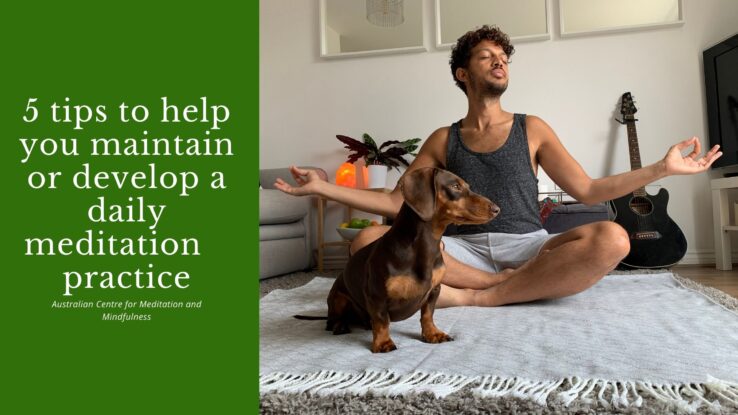5 tips to help you maintain or develop a daily meditation practice
As a meditation teacher, we know we need to maintain our daily meditation or mindfulness practice; it is the foundation of everything we teach. On the other hand, we are all human. We miss a day here or there and at times, when life is crazy, we may find our practice slipping.
Here are some key concepts to help keep us motivated to jump back onto that cushion without delay.
Tip # 1 Remember your WHY
The biggest motivator for my practice, is the knowledge that my meditation cushion is the place where I will find the answers to the things that are bothering me or making me feel stressed.
After my practice, I know I will feel better, clearer and more efficient.
No matter what is going on in my life, I will improve my ability to handle it by engaging in my practice.
That is my biggest motivation. The faith and knowledge that meditation will help me. It never fails to improve my ability to handle my situation to some degree.
Tip # 2 Know the problem you need to solve
When there is a lot going on, I find that journaling prior to meditating helps me get in touch with:
a) what is happening in my life and how I am feeling about it and
b) what I consequently need from my practice to most effectively support myself.
For example:
– If my mind is busy and I’m feeling stressed, then a mantra meditation helps me jump out of the mental looping and relax my mind.
– If I am feeling emotional or emotionally overwhelmed then a full – length grounding meditation will help me move out of such an emotional state and restore clarity.
– If I am feeling restless, then a moving meditation will restore flow and harmony.
Tip # 3 Give yourself permission to develop a responsive self-care practice
An effective self-care practice involves a good deal of listening.
– Listening to what is happening in your outer life right now
– Listening to how you are feeling about this
– Listening to what this is illuminating about your inner life and what needs attending to
Imagine we are taking care of a child (our inner child). The first thing we do is listen to what is going on for them so we can respond appropriately and provide useful and relevant support. That is what we are doing here; for ourselves.
When we do this our meditation practice becomes an incredible resource in our lives. One that we can’t do without, and look forward to meeting each day. Like a best friend, it is always there for us when we need them. Ready to listen and support. This kind of responsive, regular support builds deep self-esteem and self-confidence. It’s like being raised by the most wonderful parent!
Tip # 4 Rethink the belief that self-care is selfish. This self-care has useful applications.
Let’s turn this false belief right on its head.
a) Anything we learn and experience in our personal practice has teaching applications. Journaling after our meditation practice allows us to document the process we have been through in supporting ourselves. Experimenting or researching various practices to find the right one to support us is an integral part of our personal and professional development. It may be the seed of our next workshop, course or blog. Nothing is wasted. Most of my ideas for teaching come in the course of my meditation sessions.
b) When it comes to our personal life and relationships, the support and care we give to ourselves translates directly into a more open heart to offer others. A heart that is less encumbered by emotional projections, unsupported stress and frustration. We can only give real love to others when we are comfortable receiving it ourselves. We need to love ourselves, and what better way to do that than to care for ourselves.
c) We are being great role models for others. When we glow with the health and wellbeing that comes from good quality self-care then we are both walking our talk and providing a pathway for others to follow. Not only our students, but also our family and friends.
Tip # 5 Make it fun
If the practice is feeling like a chore, feeling boring or frustrating, then mix it up a little. Try something new. Try a walking meditation, a chant or play some instruments, such as bowls. Bringing some playfulness and joy back into our practice can reinvigorate it and bring back the fun of the inner child.
Attending a retreat, signing up for a course, joining a meditation group or reading a meditation book can also help refresh our minds in relation to our practice. Luckily there are so many resources and teachers available.
I trust this has helped remind you of the value and benefits of your practice. You will find even more resources here on the site.
21 Day Meditation Program
These 3 short courses listed count as electives towards the Advanced Certificate of Guiding and Teaching Meditation and Mindfulness.
Journaling for Clarity Short Course
Bringing Mindfulness Home Short Course
Meditation and the Chakras Short Course
Join our FREE monthly meditation nights
If you are a current student, our Retreats are available to help reinvigorate your practice, or you can book an additional coaching call with your coach to discuss your practice via the Student Login Portal.
In the meantime, happy meditating.
With love x Lisa




